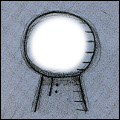It was in the theater–YOUNG FRANKENSTEIN–I first fell in love. My cousin and I sat in the very first row at the Coral Theater, way up close, and I watched Terri Garr’s six feet of cleavage in wonder and awe. I felt I could let go of my seat, free fall into that heavenly, inviting crevasse. Sticky popcorn butter and Ju-Ju-Bees held my feet down. Arms wide and leaning like a ski jumper, post-Halloween candies whizzed past, ahead of a wave of laughter. My cousin, two whole years my senior, caught me just as I was becoming airborne and hit me until my knees buckled, proclaiming my dorkhood in angry hisses.
Terri and I were together through that next summer. I came home, cleats in hand, bat and mitt over my shoulder. She greeted me at the bedroom door, frilly apron, bikini, go-go boots, asked how my day was. We simultaneously sat in each other’s lap and I confided newfound wisdom, like not diving for third base with my mouth open. She let out a sigh of thrill and worry for my titanic exploits.
When my team lost, I crawled home to her, wounded, spiked at second base. How crazy she would be. How hard she would cry. Shakespeare’s Mercurtio, I’d say, “It’s just a scratch,” stagger a few feet and fall. Next scene, in bed, cool cloth on my forehead, she was to find someone right away, preferably my cousin, and give him my complete set of Carl Yastremski baseball cards, but not my Willie Mays. I wanted to be buried with my Willie, and her bikini. Eyes closed, head fallen to a side, I listened to how hard she cried. She always cried hard. I had no complaint. I was happy.
I ruined it. I wasn’t looking for her. I went along to the Buy-Right Grocery to shake mom down for baseball cards. The name tag on her peach smock read Candi. She caressed her gum with white teeth and smiled at me. My insides shrank within my four-foot, ten-inch, frame that feared no line drive. Her platinum blonde hair ended in brown roots that matched her eyebrows and smiling eyes. She was the most beautiful woman I ever saw.
“What’s your name?” she asked, and ran her pink nails down the ivory colored ceramic keys of the cash register, punching two of them. Things tumbled inside the register. I swallowed hard.
“Well, tell her your name,” mom said.
I said my name like it didn’t matter, like it wasn’t cool enough for me.
“Are these your baseball cards?” she asked. “Want them now?” She smiled.
I nodded.
I rode home with the baseball card packages in my lap. I usually tore them open right away, but, this time, I thought of sleeping with them under my pillow.
Candi.
Young Frankenstein left the theater a long time ago. The heavenly inviting crevasse, the beauty and wonder of Garr Canyon, was a solid white wall.
My second base spike wound sometimes healed before I made it upstairs. The night Terri left me, my mom asked, “What’s wrong with your leg?”
Nuthin’
“Stop throwing your bat on the floor.”
It spooked me.
Terri was brushing her hair when I came into the room.
“Do you love me,” she asked, looking up, face void of all features.
“I can’t remember,” I said, unable to look at her.
“I’m going to my mother’s,” she said.
“Fine,” I said.
“Fine,” she said.
“Fine,” I said.
Terri.
She packed her bikinis and apron in a suitcase and left, passing the peach smock that hung from the back of my desk chair, making it swing a little.
————
 Richard Sensenbrenner formally studied to be a writer a long time ago at Southern Illinois University, Carbondale. He was then forced to get “a real job,” which turned out not to be the end of the world. Sometimes, at a meeting, his pen will drift to the margins of his legal pad and the outline of a story idea will begin. He has recently been published at Ancient Paths, The Corner Club Press, Down in the Dirt, No Extra Words, and Every Day Fiction.
Richard Sensenbrenner formally studied to be a writer a long time ago at Southern Illinois University, Carbondale. He was then forced to get “a real job,” which turned out not to be the end of the world. Sometimes, at a meeting, his pen will drift to the margins of his legal pad and the outline of a story idea will begin. He has recently been published at Ancient Paths, The Corner Club Press, Down in the Dirt, No Extra Words, and Every Day Fiction.
